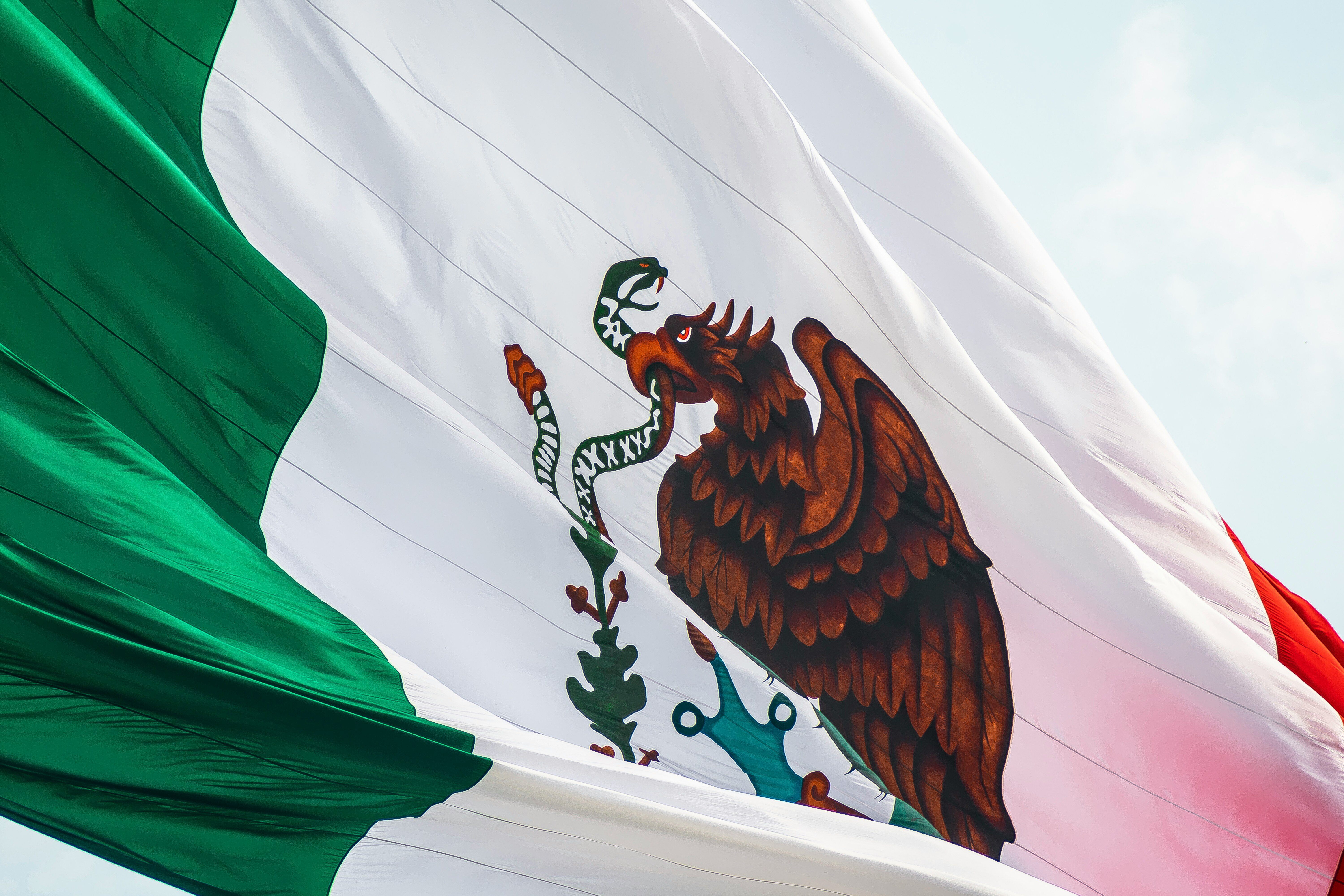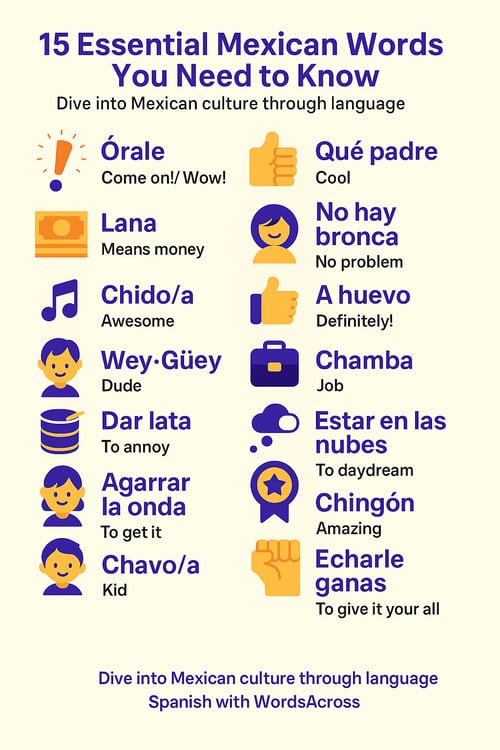15 Essential Mexican Words You Need to Know

Mexico is a land of ancient civilizations, breathtaking landscapes, and warm-hearted people, where language is as colorful and vibrant as its culture. Today, we invite you to discover 15 Mexican slang words that will not only enrich your Spanish but also help you connect more deeply with the spirit of Mexican life. Whether you're strolling through the streets of Mexico City or soaking up the sun in Cancún, these Mexican Spanish expressions will open doors to authentic connections with locals.
-
Órale
One of the most versatile Mexican slang words, used to express excitement, surprise, or to cheer someone on. It's equivalent to saying “Come on!” or “Wow!” You’ll hear this term in all kinds of situations. Imagine being at a market in Guadalajara and exclaiming, “¡Órale!” when something surprises you or you find a great deal.
Example:
“¡Órale! Ese mercado está increíble.” (Wow! That market is amazing.)
-
Qué padre
Although it literally means “What a father,” this Mexican Spanish expression is used to say something is great or awesome. It’s a fun and common way to show approval or admiration.
Example:
“Qué padre está esa playa.” (That beach is awesome.)
-
No hay bronca
A laid-back way to say “No problem.” In the hustle and bustle of Mexican cities, this is useful for letting someone know everything is okay, especially if they’re apologizing or explaining a mistake.
Example:
“¿Te molesta si llego tarde?” “No hay bronca.” (Do you mind if I’m late? No problem.)
-
Chido/a
A very common Mexican word meaning “cool” or “awesome.” It’s super versatile and can be used to describe everything from music to clothes to fun activities.
Example:
“La música en esa fiesta está bien chida.” (The music at that party is really cool.)
-
A huevo
A very popular and informal expression used to show strong agreement or excitement, similar to saying “Of course!” or “Definitely!” It adds authenticity and energy to everyday conversations.
Example:
“¿Vas al concierto?” “¡A huevo!” (Are you going to the concert? Definitely!)
-
Wey (or Güey)
Similar to “bro” or “dude” in English. “Wey” is a casual term for friends. Its meaning can vary depending on context, but it’s very common among acquaintances.
Example:
“¿Qué onda, wey?” (What’s up, dude?)
-
Chamba
When talking about work, “chamba” is one of the Mexican slang words for “job” or “employment.”
Example:
“Estoy buscando chamba en México.” (I’m looking for a job in Mexico.)
-
Dar lata
This phrase means “to bother” or “to annoy.” If someone’s being annoying or causing a fuss, you can say they’re “dando lata.”
Example:
“Esa persona no deja de dar lata.” (That person won’t stop bothering.)
-
Estar en las nubes
Literally “to be in the clouds,” it describes someone who is distracted or daydreaming. It’s the perfect expression for those moments when your mind drifts off.
Example:
“Perdón, estaba en las nubes.” (Sorry, I was daydreaming.)
-
Agarrar la onda
This means “to get it” or “to catch on.” Use it when you finally understand a difficult concept or get used to something.
Example:
“Después de un rato, agarré la onda del español.” (After a while, I caught on to Spanish.)
-
Chavo/a
In Mexican Spanish, “chavo” refers to a young guy, and “chava” to a young girl. It’s an informal and affectionate term.
Example:
“Ese chavo es muy simpático.” (That guy is really nice.)
-
Estar frito/a
When you’re exhausted, this is the perfect phrase. “Estar frito” conveys the feeling of being totally wiped out after a long day.
Example:
“Después de caminar todo el día, estoy frito.” (After walking all day, I’m wiped out.)
-
Chingón
A term used to describe something impressive or amazing. If something is “chingón,” it’s top-notch. Just be aware it’s a bit informal and not suited for all situations.
Example:
“Ese concierto fue chingón.” (That concert was badass.)
-
Lana
If you need to talk about money, “lana” is the perfect slang word. Use it casually when discussing prices or budgets.
Example:
“No tengo mucha lana ahora.” (I don’t have much money right now.)
-
Echarle ganas
This motivational expression is very popular in Mexico. It’s used to encourage someone to give their best effort—like saying “do your best” in English.
Example:
“Aunque esté difícil, échale ganas.” (Even if it’s hard, do your best.)

Dive Into Mexican Culture Through Language
Learning these 15 Mexican Spanish expressions is more than just expanding your vocabulary—it’s a gateway to understanding a rich and vibrant culture. By using these slang words, you won’t just communicate better; you’ll show genuine interest in connecting with the people of Mexico.
Remember, language is the key to unlocking new friendships, cultural insights, and unforgettable experiences. At WorldsAcross, we’ll teach you not just these but many more Mexican Spanish expressions to help you master the language and live every word authentically. ¡Échale ganas y aprende español con nosotros!



